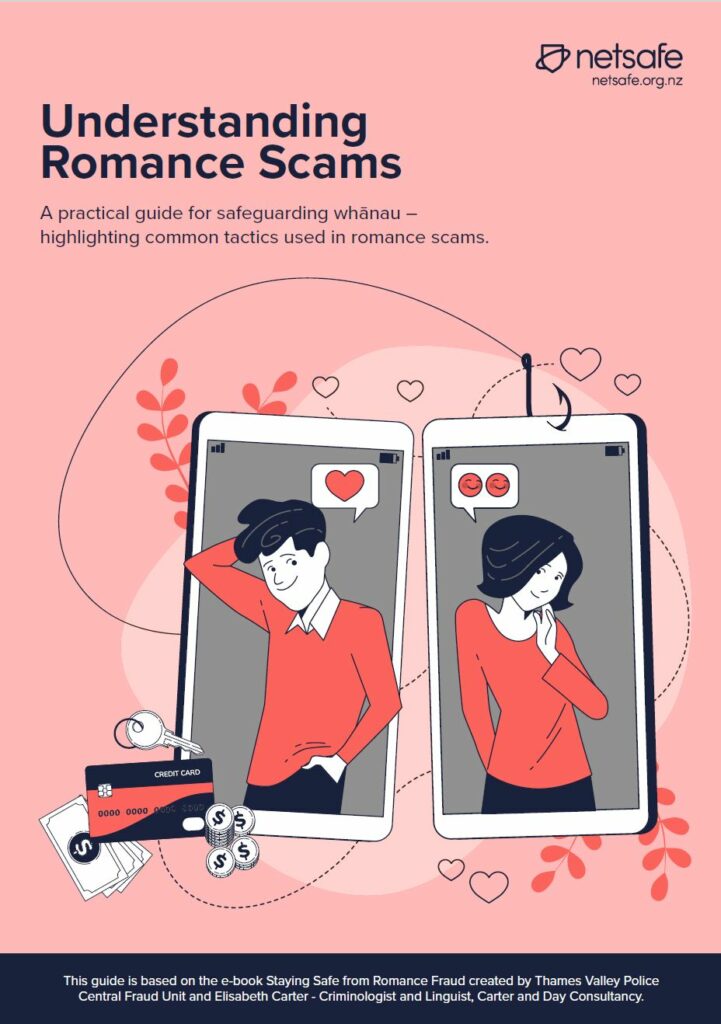Romance scams
On Valentine’s Day 2024, Netsafe launch a new resource for New Zealanders: “Understand Romance Scams” – a practical guide for safeguarding whanau – showcasing common tactics used in romance scams and providing advice for families who are worried about loved ones.

On Valentine’s Day 2024, Netsafe launch a new resource for New Zealanders on how to “Understand Romance Scams” –
It’s a practical guide for safeguarding whanau – showcasing common tactics used in romance scams and providing advice for families who are worried for loved ones to have the difficult conversations needed to help them.
We encourage you to share it in your communities and help us to keep more people safe from the harm this type of fraud can leave in its wake.
This guide is based on the e-book Staying Safe from Romance Fraud created by Thames Valley Police Central Fraud Unit and Criminologist and Linguist Elisabeth Carter. They have kindly shared their work with us so we could support New Zealanders too.
What are romance scams?
A scammer pretends to be in a relationship with someone online in order to scam them out of money. They do this through email, social media, dating websites and other websites and apps. Usually these scammers are pretending to be someone they’re not, using photos and identities of people they’ve found online. We’ve had cases of romance scams reported to us where people have lost substantial amounts of money – ranging from a few hundred dollars, through to millions of dollars.
It can be difficult to understand how this can happen, but it’s important to remember that these scammers spend a lot of time and energy building a relationship online, and can make the relationship seem very real.
They will have a fake backstory, family, friends and job. Often they’re scamming more than one person at a time. Once they’ve worked to gain the trust of the person they’ve targeted, they will use various stories to get money or details from that person. They may start by requesting small sums of money to test the waters, and then build up to requesting larger amounts.
Sometimes they won’t actually ask for money, but they will talk about problems that can be solved by money, because they know that the target will offer financial assistance. In some cases the scammer may try to get the person targeted to unknowingly help launder money for their criminal activities.
Identifying romance scams
Some of the signs that you might be being scammed include:
- Moving quickly: Confessions of love or strong feelings within a short time of meeting the person online
- Personal troubles, that can be solved with money: If your new love mentions health problems, family issues, business troubles or other issues that could be solved with money
- Requests for money: You should be wary of any request for money
- Changes in communication style: If there are several scammers taking turns maintaining the relationship, their writing styles may change
- Be wary if they’re hesitant about meeting: If a new romantic contact is not willing to meet up or talk via video call, or comes up with a series of excuses to avoid meeting, you should be cautious
- Financial assistance to meet in person: Also be careful about offering or giving the person money so that they can meet you in person
- Reverse image search: You can check if the images they’ve sent you are being used publicly online in other places using the instructions below
Some scammers are more than willing to play the waiting game. Scammers may keep a “relationship” going for months or even longer before they begin to request money or drop hints about problems that could be solved with money. If you’re dating someone online, check out our online dating advice for tips on how to stay safe when dating online
How to avoid romance scams
- Be cautious about who you communicate with online
- Don’t respond to requests or hints for money
- Never send money to anyone you don’t know or haven’t met in person
- Avoid giving out personal details that could be used to impersonate you
- If you think you’re being scammed, stop all contact and avoid sending further payments
- Contact Netsafe for free and confidential advice if you feel something isn’t quite right
Always protect information that can be used to access your accounts, build a fake online presence or impersonate you. This includes:
- Login details and passwords to any online account including banking, email, social media and trading sites
- Bank account and credit card details
- Address
- Phone number
- Birthdate
- Personal information linked to the security questions on your online accounts
- Driver’s license
- Passport details
Reverse image searches
Romance scammers often steal photos published online and use these identities to approach people. Photos of models and uniformed soldiers are popular, however photos can be taken from anyone who publishes them publicly online – for example, from Facebook profiles. If you’re suspicious about a new contact there is an easy way to see where their photo is being used on the web, by performing a reverse image search using Google Images.
How to reverse image search
- Download a copy of the photo of the person on to your device
- Go to Google Image search, select the camera icon 📷 and upload the photo
- Google will return a list of results showing where the picture is being used on the internet
You may want to reverse image search using more than one image of the person. Remember this is not a fail-safe way to detect romance scams, but it is a useful tool as many scammers will take these photos offline. They’ll also often use the same image in more than one scam they are running.
If you have been scammed
Many of these scams are professional operations and these people are very good at their job, so the important thing is not to feel embarrassed and to reach out for advice. If you believe that you have been or may have been scammed, you can contact Netsafe for free and confidential advice on what to do next.
You can report the incident to the Police, but it is very likely the scammer is operating from a country overseas. If you’ve sent money offshore (via a money transfer service) it is unlikely these funds will be recovered or the offender(s) identified, as cybercriminals are very proficient at concealing their identities and often reside in countries that lack reliable law enforcement for NZ Police to liaise with.
What if a friend or family member is being scammed?
If you suspect a friend or family member is being scammed, you may need to intervene. Think carefully about who the best person is to have the conversation – this should be someone who they trust. The scammers have spent time and effort building trust, so convincing the person targeted that they are being scammed may not be an easy conversation.
It can be difficult to deal with the financial losses involved and the psychological trauma of being defrauded and jilted by someone they’ve come to “know” and care about. Often the person targeted can feel very embarrassed about the situation. After months or years of building up trust, friends or relatives who warn victims that they are being scammed can find the person being targeted is unwilling to believe it’s a scam.
Report a romance scam
Help if you have been scammed or think you are about to be scammed: Netsafe can’t open investigations or track scammers, but we can offer support and advice for people who have lost money in a scam, or think they are about to. This includes letting you know the steps you can take depending on the scam you’re in and giving you advice about how to stay safe in future. You can report a scam to www.netsafe.org.nz/report.
Our help service is open from 8am – 8pm weekdays and 9am – 5pm on weekends.
MORE SCAMS
Be alert and stay safe online. Keep up to date on the latest scams so you can protect yourself and your loved ones from falling victim.
Keep up to date
Follow us on social media and sign up to our newsletter for alerts, news and tips.







